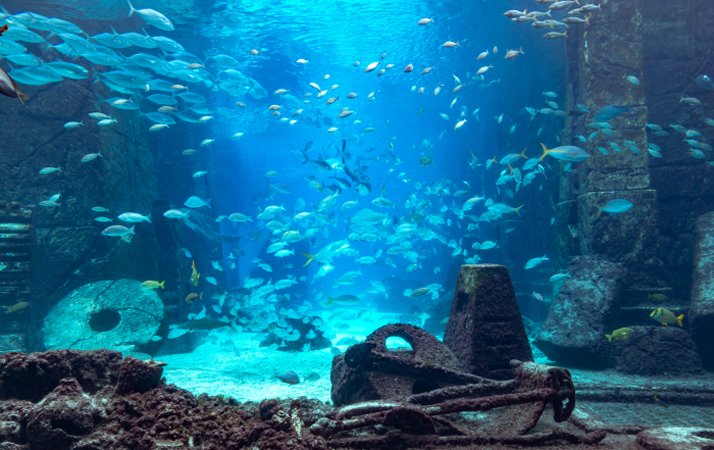Riddle Of Brazilian Atlantis – Strange Discovered Rocks The World Forgot About
Ellen Lloyd - AncientPages.com - The legendary lost continent of Atlantis appears in ancient myths and legends worldwide. Ancient people were familiar with a marvelous land that vanished a very long time ago.
Researchers have debated the existence of Atlantis for years. Some say the continent is nothing but a myth, while others are convinced, we will one day uncover the remains of this long-lost land.
Finding the remains of Atlantis is challenging because it’s difficult to determine where to look. Also, let us assume we do find ancient underwater ruins, how can we say with certainty these are the remains of Atlantis? There are many submerged ancient cities.
The quest for the lost underwater land has not ended. Credit: Foto-Jagla.de - Adobe Stock
There are several underwater ruins in various places worldwide, and all of them could be part of Atlantis. Atlantis is Greek for the 'island of Atlas'.
Plato mentioned the sunken continent of Atlantis in his dialogues Timaeus and Critias.
Plato relates the legend of a powerful nation that around 9,500 B.C. inhabited a continent greater in size than ancient Libya and Asia combined.
According to Plato, this powerful nation attacked and conquered Europe and Asia.
Apparently, only the Greeks were able to prevail against them. As the story goes, sometime after the invasion the Greeks and the Atlanteans were swallowed up by the sea. The disaster happened quickly and unexpectedly.
Over the years several researchers claim to have uncovered parts of the sunken legendary continent and there have been several speculations regarding the location of the sunken land.
For example, In Atlantis: The Lost Continent Finally Found, Professor Arysio Santos makes a persuasive and well-researched case for Atlantis being in the region of Indonesia.
"Atlantis was never found because we have all been looking in the wrong places. Realizing that, we started to look for the spot where an entire sunken continent could be hiding itself. Geology afforded the correct, irrefutable answer: down under the South China Sea, that is where. The rest followed quite naturally and, in fact, far more serendipitously than we ourselves could ever have imagined beforehand," late Professor Arysio Santos explained.
1997 Interview with Prof. Arysio Santos
We have seen on previous occasions scientists are making remarkable progress in the area of underwater archeology, but a huge portion of our oceans remains unexplored.
According to the National Ocean Service, it is estimated that only 5 percent of Earth's oceans have been explored and charted. The rest remains mostly undiscovered and unseen by humans. With so much territory still left to explore, we can only imagine the discoveries yet to come!
In recent years, we have been given the privilege to see photos of remarkable underwater ruins, such as the magnificent legendary lost city of Heracleion.
With the help of the latest technology, we have the opportunity to explore the secrets of oceans as never before. For example, the legendary lost underwater city of Pavlopetri is often described as the world's oldest city. Some think that these underwater ruins are remains of the legendary city of Atlantis.
Some years ago, geologists discovered puzzling rocks off the coast of Rio in Brazil. According to Roberto Ventura Santos, a top official at Brazil's Geology Service (CPRM), the granite samples were found two years ago during dredging operations in an area known as "Rio Grande Elevation" range in Brazilian and international waters.
At the time of the discovery, Santos said that these rocks were likely part of a continent that sunk into the ocean when Africa and South America drifted apart 100 million years ago - dubbing the discovery the 'Brazilian Atlantis'.
Brazil's Geology Service dredged the seabed off the coast of Rio, near the Rio Grande Elevation. Among the rocks found were granite samples that are thought to be part of a continent submerged by the Atlantic Ocean when Africa and South America split 100 million years ago. Credit: Geological Service of Brazil
"This could be the Brazilian Atlantis. We are almost certain, but we must bolster our hypothesis. We will have final (scientific) recognition this year when we conduct drilling in the area to retrieve more samples of these rocks," Santos said then.
Could this rock be part of the legendary lost continent of Atlantis? Credit: Geological Service of Brazil
Initially, the scientists thought they were mistaken. Still, their case was bolstered when a team of Brazilian and Japanese scientists aboard Japan's manned research submersible Shinkai 6500 observed the underwater geological formation opposite the Brazilian coast.
As researchers explored the region, they began to see that the area could be a piece of the continent that disappeared into the sea millions of years ago.
Should these rocks be considered as possible physical evidence of Atlantis? For the time being, it is difficult to say anything about this discovery. To confirm geologists' claims, someone must be interested in testing these rocks and examine the underwater formations.
Unfortunately, reports of recent research are lacking, and it seems nothing has been done in years. It happens far too often scientists discovered something of tremendous historical, archaeological, or geological interest, but follow-ups of the discoveries are unheard of.
Written by Ellen Lloyd – AncientPages.com
Updated on June 27, 2021
Copyright © AncientPages.com All rights reserved. This material may not be published, broadcast, rewritten or redistributed in whole or part without the express written permission of AncientPages.com
More From Ancient Pages
-
 Medieval Rich People Unknowingly Poisoned Themselves With Lead And Other Hazardous Heavy Metals
Archaeology | Nov 29, 2015
Medieval Rich People Unknowingly Poisoned Themselves With Lead And Other Hazardous Heavy Metals
Archaeology | Nov 29, 2015 -
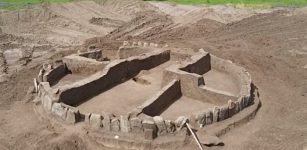 Ancient Secrets Of The Ukrainian Stonehenge That Is Older Than The Giza Pyramids Of Egypt
Featured Stories | Jul 17, 2021
Ancient Secrets Of The Ukrainian Stonehenge That Is Older Than The Giza Pyramids Of Egypt
Featured Stories | Jul 17, 2021 -
 Unusual Ancient Skeletons Found In Minnesota – But Some Are Not What They Seem
Archaeology | Dec 10, 2024
Unusual Ancient Skeletons Found In Minnesota – But Some Are Not What They Seem
Archaeology | Dec 10, 2024 -
 How King Arthur Became One Of The Most Pervasive Legends Of All Time
Featured Stories | Feb 12, 2017
How King Arthur Became One Of The Most Pervasive Legends Of All Time
Featured Stories | Feb 12, 2017 -
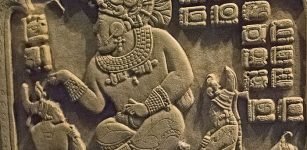 Fall Of The Ancient Maya Civilization Not Caused By Climate Change And Environmental Degradation – Scientists Say
Archaeology | Nov 18, 2021
Fall Of The Ancient Maya Civilization Not Caused By Climate Change And Environmental Degradation – Scientists Say
Archaeology | Nov 18, 2021 -
 Perchta: Evil Witch Of The Alps – An Old Tradition That Still Continues
Christmas Traditions | Dec 16, 2024
Perchta: Evil Witch Of The Alps – An Old Tradition That Still Continues
Christmas Traditions | Dec 16, 2024 -
 Bizarre Event – Why Did Hundreds Of Individuals Suddenly Freak Out At A Cemetery?
Featured Stories | May 30, 2023
Bizarre Event – Why Did Hundreds Of Individuals Suddenly Freak Out At A Cemetery?
Featured Stories | May 30, 2023 -
 Tool Patterns Reveal What Caused The Neanderthals’ Extinction In The Iberian Peninsula
Archaeology | Mar 30, 2022
Tool Patterns Reveal What Caused The Neanderthals’ Extinction In The Iberian Peninsula
Archaeology | Mar 30, 2022 -
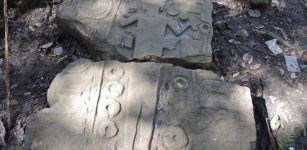 Mystery Of The Ancient Forgotten Mizoram Civilization And Lost City Of Vangchhia
Civilizations | Jun 16, 2020
Mystery Of The Ancient Forgotten Mizoram Civilization And Lost City Of Vangchhia
Civilizations | Jun 16, 2020 -
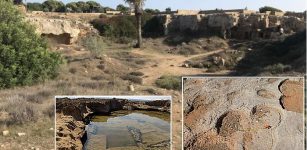 Rediscovery Of Lost Tombs And Quarries On A British Military Base In Cyprus
Archaeology | Mar 7, 2024
Rediscovery Of Lost Tombs And Quarries On A British Military Base In Cyprus
Archaeology | Mar 7, 2024 -
 Eye Of Ra – Powerful Ancient Egyptian Symbol With Deep Meaning
Ancient Symbols | Jan 23, 2019
Eye Of Ra – Powerful Ancient Egyptian Symbol With Deep Meaning
Ancient Symbols | Jan 23, 2019 -
 Historians Search For A Frightening Ancient Underground Secret In One Of Tampa Bay’s Cities
Featured Stories | Sep 1, 2024
Historians Search For A Frightening Ancient Underground Secret In One Of Tampa Bay’s Cities
Featured Stories | Sep 1, 2024 -
 Metal Artifacts In Southeast Asia Archaeological Theory – Challenged
Archaeology | Jul 31, 2021
Metal Artifacts In Southeast Asia Archaeological Theory – Challenged
Archaeology | Jul 31, 2021 -
 Mysterious Cave Of Prophetess Cumaean Sibyl – Ancient Portal To The Underworld
Featured Stories | Dec 25, 2017
Mysterious Cave Of Prophetess Cumaean Sibyl – Ancient Portal To The Underworld
Featured Stories | Dec 25, 2017 -
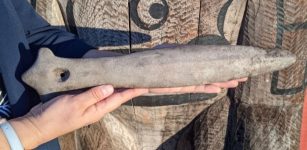 Unique Ancient Coast Salish War Club Accidently Discovered In British Columbia Backyard
Archaeology | Mar 22, 2022
Unique Ancient Coast Salish War Club Accidently Discovered In British Columbia Backyard
Archaeology | Mar 22, 2022 -
 Norman Dominance Of Europe Inspired First Crusades In The Holy Land – New Book Claims
History | Sep 8, 2022
Norman Dominance Of Europe Inspired First Crusades In The Holy Land – New Book Claims
History | Sep 8, 2022 -
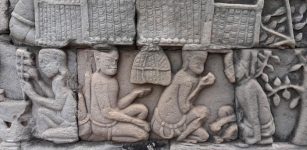 What Can The Fate Of Ancient Cities Teach Us About Surviving Climate Change
Archaeology | Oct 1, 2021
What Can The Fate Of Ancient Cities Teach Us About Surviving Climate Change
Archaeology | Oct 1, 2021 -
 Mystery Of Feodor Kuzmich – Did Tsar Alexander I Fake His Death?
Featured Stories | Mar 23, 2020
Mystery Of Feodor Kuzmich – Did Tsar Alexander I Fake His Death?
Featured Stories | Mar 23, 2020 -
 Voice Belonging To 3,000-Year-Old Egyptian Mummified Priest – Recreated
Archaeology | Jan 28, 2020
Voice Belonging To 3,000-Year-Old Egyptian Mummified Priest – Recreated
Archaeology | Jan 28, 2020 -
 How Ancient Seascapes Shaped The Genetic Structure Of European Populations
Archaeology | May 20, 2022
How Ancient Seascapes Shaped The Genetic Structure Of European Populations
Archaeology | May 20, 2022

